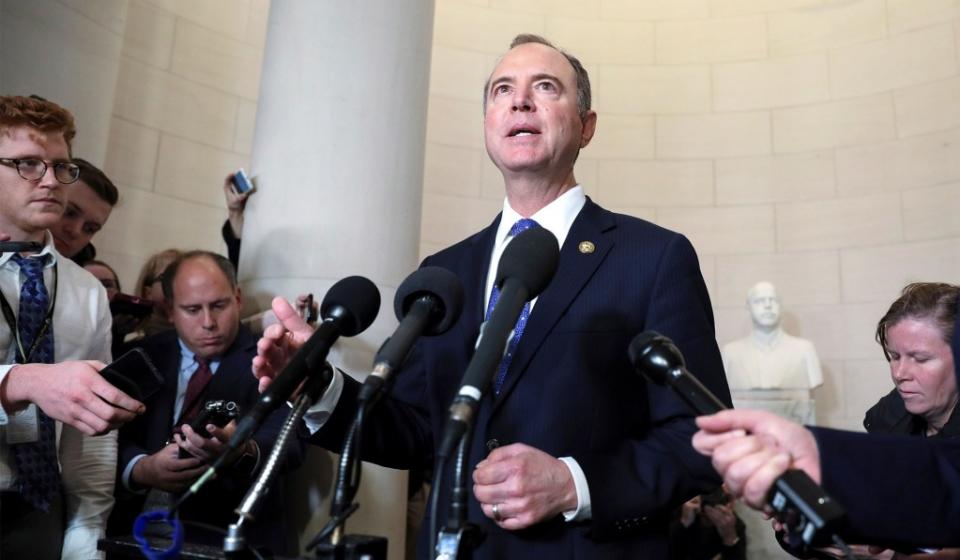Adam Schiff’s Attack on the Free Press

Where are all the self-styled champions of the free press now that Adam Schiff has used the surveillance powers of the state to smear not only his political rivals but a journalist?
With the release of the House Intelligence Committee’s impeachment report Tuesday came the revelation that Giuliani and his Ukrainian affiliate Lev Parnas, whose metadata Schiff apparently subpoenaed, had exchanged calls with former The Hill columnist John Solomon, ranking Intelligence Republican Devin Nunes, and attorney Jay Sekulow. Even if we allow that the California congressman had genuine national-security concerns when he subpoenaed metadata from AT&T so he could snoop on his political opponents, what possible national-security concerns would justify unmasking them?
This was an impeachment inquiry, not a criminal investigation. If Nunes had conducted himself similarly with Hillary Clinton’s personal lawyers, the D.C. press corps would have exploded into a raging panic. Rest assured, if Schiff had unearthed anything meaningful — and the subpoenas reportedly went out before the impeachment inquiry even began — he would have shared the evidence during the inquiry rather than using it as partisan chum in a post-inquiry report.
None of those unmasked by Schiff were the target of the inquiry, and, as far as we know, none of their conversations he exposed were unlawful. Nor were any of these conversations relevant in making a case for the impeachment of Donald Trump, especially without information beyond the time, dates, and lengths of the phone calls.
Schiff’s decision to unmask a journalist, though, was especially disconcerting. It meets none of law enforcement’s typical standards.
Now, if your position is that former Hill columnist John Solomon was smearing former Ambassador Marie Yovanovitch and pushing a flawed Ukraine narrative, feel free not to read his work anymore. Feel free, in fact, to make a case that his work is conspiratorial rubbish. But Solomon isn’t under criminal investigation for bad journalism, and he wasn’t a witness in the inquiry. It’s none of Schiff’s business whom Solomon speaks to over the phone. He is free to call Lev Parnas, or whomever else he pleases, as often as he pleases. Journalists often speak to shady characters like Parnas, and they shouldn’t have to worry that some power-drunk congressman is rummaging through their call logs.
And if Solomon’s being wrong about Ukraine is sufficient grounds for Schiff to unmask his name during an inquiry, then what would stop a Republican majority from casting a wide enough net to unmask the many reporters who spent the past four years disseminating one misleading Russian-collusion theory after the next? How many of those reporters were on the phone with gossipmongers from Fusion GPS — or from Schiff’s office?
Schiff’s disclosure of Solomon’s name was a transparent attempt to discredit him. Yet big-name journalism professors and sentinels of constitutional norms, the same people who claimed that protecting the anonymity of the whistleblower was a moral imperative, had nothing to say about a powerful congressman unmasking a reporter. Jameel Jaffer, executive director of the Knight First Amendment Institute at Columbia University — tackling “issues from the balance between privacy and national security to the very meaning of news” — told the Washington Examiner:
It’s pretty rich to see people who’ve led the charge to expand government surveillance powers crying foul over the most basic, constitutionally sanctioned evidence gathering in an investigation of alleged — and increasingly apparent — criminal wrongdoing. Be serious.
So what if those complaining about Schiff have also advocated the expansion of government surveillance powers? Does the Knight First Amendment Institute have neutral principles on the issue of privacy, or does it defend only those who’ve agreed with its policy positions in the past? And if Schiff’s unmasking of an inconvenient journalist is just an ordinary instance of evidence gathering, as Jaffer contends, can he provide any other instances where a congressional committee running a political investigation unmasked a journalist who was reporting on the very issue being debated?
Legality isn’t always the question anyway. I highly doubt Jaffer believes that it’s okay for judges to throw journalists into prison for contempt charges when they protect their sources. After all, courts have the legal authority to do so, and abuses of power are often about exploiting existing and technically legal practices.
“When we start looking into each other’s phone records and who we talked to, that gets to be chaos, and I will have no part of that,” Lindsey Graham said today, turning down a House Republican request for Senate Republicans to start subpoenaing phone records. But this brand of partisanship turns into an arms race of stupid, and eventually the abuses it spawns will become the new normal.
